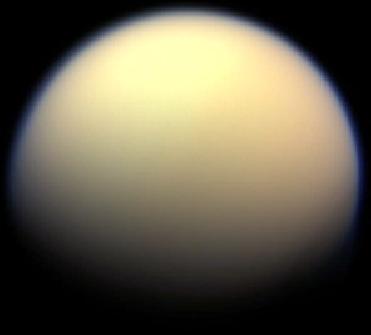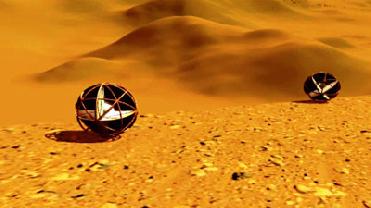
Saturn's moon Titan.
LONDON (PTI): Astronomers claim to have found hints of life on Saturn's moon Titan which is much too cold to support even liquid water on its surface.
According to the 'New Scientist', the two potential signatures of life on Titan were found by Cassini spacecraft, but scientists have pointed out that non-biological chemical reactions could also be behind the observations.
Still many feel that exotic life-forms could live in the lakes of liquid methane or ethane that dot the moon's surface and that such microbe could eke out an existence by breathing in hydrogen gas and eating the organic molecule acetylene, creating methane in the process.
This would result in a lack of acetylene on Titan and a depletion of hydrogen close to the moon's surface, where the microbes would live, according to the scientists.
Now, measurements from the Cassini spacecraft have borne out these predictions, hinting that life may be present.
The infrared spectra of Titan's surface taken with the Visual and Infrared Mapping Spectrometer of Cassini showed no sign of acetylene, even though ultraviolet sunlight should constantly trigger its production in moon's thick atmosphere.
Cassini measurements also suggest hydrogen is disappearing near Titan's surface, according to a study by Darrell Strobel of Johns Hopkins University in Baltimore.
Observations with the spacecraft's Ion and Neutral Mass Spectrometer and its Composite Infrared Spectrometer revealed that hydrogen produced by UV-triggered chemical reactions in the atmosphere is flowing both upwards and off into space as well as down towards the surface.
Yet the hydrogen is not accumulating near the surface, hinting that something may be consuming it there, according to the results.
 Previous Article
Previous Article













The Indian Air Force, in its flight trials evaluation report submitted before the Defence Ministry l..
view articleAn insight into the Medium Multi-Role Combat Aircraft competition...
view articleSky enthusiasts can now spot the International Space Station (ISS) commanded by Indian-American astr..
view article